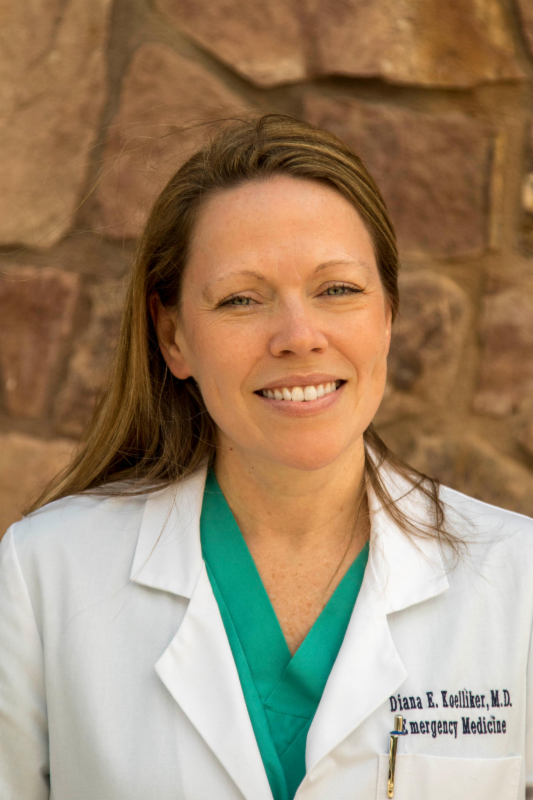
29 Feb Telluride Medical Center Prepares for Coronavirus
As the nation braces for what could be the first pandemic since the 2009 H1N1 outbreak, local health workers at the Telluride Regional Medical Center are preparing for novel coronavirus COVID-19 by solidifying protocols, compiling preparedness public service announcements, expanding telehealth capabilities and, above all, urging the community to use common sense hygiene practices.

Dr Diana Koelliker
“At this point there’s no immediate risk, but to ensure we’re ready, should the situation change, we’re holding regular meetings to determine the best ways to offer care to those suspected of exposure,” said Dr. Diana Koelliker, director of trauma and emergency services.
On Monday the World Health Organization said that while it is too early to call the Covid-19 outbreak a pandemic, countries should be “in a phase of preparedness.”
“What we do know is that more than 80 percent of the cases reported are not severe and the symptoms look a lot like influenza, which at this point is a far greater threat to our population,” said Dr. Koelliker.“We don’t want the community to worry so much as we want everyone to be prepared.”
In addition to what the CDC recommends for preparedness — stocking up on food, hydrating drinks and both prescription and over the counter meds — local doctors caution there are additional considerations for those living at altitude.
“We’d like every household in this community to own a thermometer and a pulse oximeter,” said Dr. Sharon Grundy.
An oximeter attaches to a finger to measure oxygen saturation levels, or the oxygen levels in blood. These devices are inexpensive, but can be instrumental in determining someone’s pulmonary health at elevation.
“At altitudes like that of Telluride’s, normal oxygen saturation levels stay between 90 and 93 percent, when oxygen levels drop below 88 we know it’s time to see the patient possibly for a chest x-ray or to be monitored,” added Dr. Grundy.
Having a community that is prepared and informed can make a big difference.
Doctors do report there has been an uptick in calls this week from patients who want to know if they should still take their off-season vacation.
“We can’t stress this enough, the CDC is going to be the best resource for everyone — including us,” said Dr. Grundy. (Visit CDC.gov)

Dr. Sharon Grundy
Additionally, Colorado Department of Public Health and Environment has a hotline for coronavirus questions: 303-389-1687.
The other question they’re hearing: Is there a coronavirus test patients could take?
“There is absolutely no ‘rapid coronavirus test’ at our clinic,” stressed Dr. Koelliker.
In fact, again according to Dr. Koelliker, there is an extensive CDC protocol with multiple qualifying factors that must be met to even warrant a test.
“The availability of the rapid test is likely to improve over the coming weeks, the Colorado Department of Public Health now has the test available, but we will not have the test in San Miguel county for the foreseeable future because of our limited lab capabilities.”
If you think you could have been exposed to coronavirus — as in you’ve recently traveled to a place where outbreaks have been reported, or have had close contact with someone else who has — and now have a fever, cough, and shortness of breath, the medical center would like to hear from you.
“By phone,” said Dr. Grundy.
Should the virus spread to the region, one tactic the medical center may utilize are telehealth visits.
“There are a great number of patients who can be adequately cared for via telehealth visits,” Dr. Grundy added. “If the novel coronavirus spread escalates, our telehealth portal will allow us to safely reach out to patients.”
Established patients of the Medical Center need only a smartphone or computer, a connection to the internet and have signed a consent form to participate in a telehealth visit.
“Our biggest challenge, as a small isolated clinic, will be our capacity and limited resources,” said Dr. Grundy.
Ultimately, conventional wisdom reflects the fact that the doctors want to drive home: If you are sick, stay home from work or school. Stay away from others that are sick or coughing.
“Wash your hands. Wash your hands. Wash your hands,” said Dr. Koelliker.
Also, cover your mouth when you cough or sneeze, but with your elbow, not your hands.
“And then go wash your hands again,” added Dr. Koelliker.


Pingback:Telluride Med Center: Coronavirus (COVID-19) Testing Update | Telluride Inside... and Out
Posted at 19:20h, 04 March[…] Go here for more. […]
Pingback:Telluride Med Center: COVID-19 | Telluride Inside... and Out
Posted at 18:20h, 05 March[…] Go here for more. […]